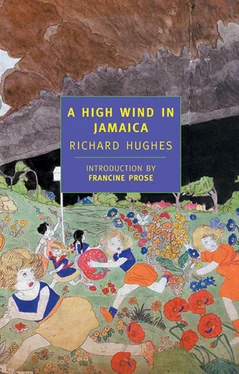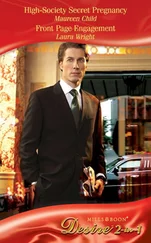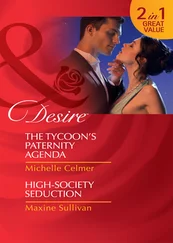Miss Dawson had taken charge of them all, meaning to convey them to her Aunt’s London house till their relations could be found. So now she took them ashore, and up to the train, into which they climbed.
“What are we getting into this box for?” asked Harry: “Is it going to rain?”
It took Rachel several journeys up and down the steep steps to get all her babies inside.
The fog, which had met them at the mouth of the river, was growing thicker than ever. So they sat there in semidarkness at first, till a man came and lit the light. It was not very comfortable, and horribly cold: but presently another man came, and put in a big flat thing which was hot: it was full of hot water, Miss Dawson said, and for you to put your feet on.
Even now that she was in a train, Emily could hardly believe it would ever start. She had become quite sure it was not going to when at last it did, jerking along like a cannon-ball would on a leash.
Then their powers of observation broke down. For the time they were full. So they played Up-Jenkins riotously all the way to London: and when they arrived hardly noticed it. They were quite loath to get out, and finally did so into as thick a pea-soup fog as London could produce at the tail end of the season. At this they began to wake up again, and jog themselves to remember that this really was England , so as not to miss things.
They had just realized that the train had run right inside a sort of enormous house, lit by haloed yellow lights and full of this extraordinary orange-colored air, when Mrs. Thornton found them.
“Mother!” cried Emily. She had not known she could be so glad to see her. As for Mrs. Thornton, she was far beyond the bounds of hysteria. The little ones held back at first, but soon followed Emily’s example, leaping on her and shouting: indeed it looked more like Actaeon with his hounds than a mother with her children: their monkey-like little hands tore her clothes in pieces, but she didn’t care a hoot. As for their father, he had totally forgotten how much he disliked emotional scenes.
“I slept with an alligator!” Emily was shouting at intervals. “Mother! I’ve slept with an alligator!”
Margaret stood in the background holding all their parcels. None of her relations had appeared at the station. Mrs. Thornton’s eye at last took her in.
“Why, Margaret…” she began vaguely.
Margaret smiled and came forward to kiss her.
“Get out!” cried Emily fiercely, punching her in the chest. “She’s my mother!”
“Get out!” shouted all the others. “She’s our mother!”
Margaret fell back again into the shadows: and Mrs. Thornton was too distracted to be as shocked as she would normally have been.
Mr. Thornton, however, was just sane enough to take in the situation. “Come on, Margaret!” he said. “Margaret’s my pal! Let’s go and look for a cab!”
He took the girl’s arm, bowing his fine shoulders, and walked off with her up the platform.
They found a cab, and brought it to the scene, and they all got in, Mrs. Thornton just remembering to say “Howd’you-do-good-bye” to Miss Dawson.
Packing themselves inside was difficult. It was in the middle of it all that Mrs. Thornton suddenly exclaimed:
“But where’s John?”
The children fell immediately silent.
“Where is he? — Wasn’t he on the train with you?”
“No,” said Emily, and went as dumb as the rest.
Mrs. Thornton looked from one of them to another.
“John! Where is John?” she asked the world at large, a faint hint of uneasiness beginning to tinge her voice.
It was then that Miss Dawson showed a puzzled face at the window.
“ John? ” she asked. “Why, who is John?”
III
The children passed the spring at the house their father had taken in Hammersmith Terrace, on the borders of Chiswick: but Captain Jonsen, Otto, and the crew passed it in Newgate.
They were taken there as soon as the gunboat which apprehended them reached the Thames.
The children’s bewilderment lasted. London was not what they had expected, but it was even more astounding. From time to time, however, they would realize how this or that did chime in with something they had been told, though not at all with the idea that the telling had conjured up. On these occasions they felt something as Saint Matthew must have felt when, after recounting some trivial incident, he adds: “That it might be fulfilled which was spoken by the Prophet So-and-So.”
“Why look!” exclaimed Edward. “There’s only toys in this store!”
“Why, don’t you remember…” began Emily.
Yes, their mother had told them, on a visit to their father’s general store in St. Anne’s, that in London there were stores which not only sold toys but which sold toys only. At that time they hardly knew what toys were. A cousin in England had once sent them out some expensive wax dolls, but even before the box was opened the wax had melted: consequently the only dolls they had were empty bottles, which they clothed with bits of rag. These had another advantage over the wax kind: you could feed them, poking it into the neck. If you put in some water too, in a day or so the food began to digest, visibly. The bottles with square shoulders they called Hebeasties, and the bottles with round shoulders they called She-beasties.
Their other toys were mostly freakish sticks, and different kinds of seeds and berries. No wonder it seemed strange to them to imagine these things in a shop. But the idea engaged them, nevertheless. Down by the bathinghole there were several enormous cotton-trees, which lift themselves on their roots right out of the earth, as on stilts, making a big cage. One of these they dubbed their toy-shop: decorated it up with lacebark, and strings of bright-colored seeds, and their other toys: then they would go inside and take turns to sell them to each other. So now this was the picture the phrase “toy-shop” evoked in them. No wonder the London kind was a surprise to them, seemed a very far-fetched fulfilment of the prophecy.
The houses in Hammersmith are tall, roomy, comfortable houses, though not big or aristocratic, with gardens running right down to the river.
It was a shock to them to find how dirty the river was. The litter-strewn mud when the tide was out somehow offended them much less than the sewery water when it was up. At low tide they would often climb down the wall and scrounge about in the mud for things of value to them happily enough. They stank like polecats when they came up again. Their father was sensible about dirt. He ordered a tub of water to be kept permanently outside the basement door, in which they must wash before entering the house: but none of the other children in the terrace were allowed to play in the mud at all.
Emily did not play in the mud either: it was only the little ones.
Mr. Thornton was generally at a theater till the small hours; and when he came home used to sit and write, and then he would go out, about dawn, to the post. The children were often awake in time to hear him going to bed. He drank whisky while he worked, and that helped him to sleep all the morning (they had to be quiet too). But he got up for luncheon, and then he often had battles with their mother about the food. She would try to make him eat it.
All that spring they were an object of wonder to their acquaintances, as they had been on the steamer; and also an object of pity. In the wide world they had become almost national figures: but it was easier to hide this from them then than it would be nowadays. But people — friends — would often come and tell them about the pirates: what wicked men they were, and how cruelly they had maltreated them. Children would generally ask to see Emily’s scar. They were especially sorry for Rachel and Laura, who, as being the youngest, must have suffered most. These people used also to tell them about John’s heroism, and that he had died for his country just the same as if he had grown up and become a real soldier: that he had shown himself a true English gentleman, like the knights of old were and the martyrs. They were to grow up to be very proud of John, who though still a child had dared to defy these villains and die rather than allow anything to happen to his sisters.
Читать дальше












